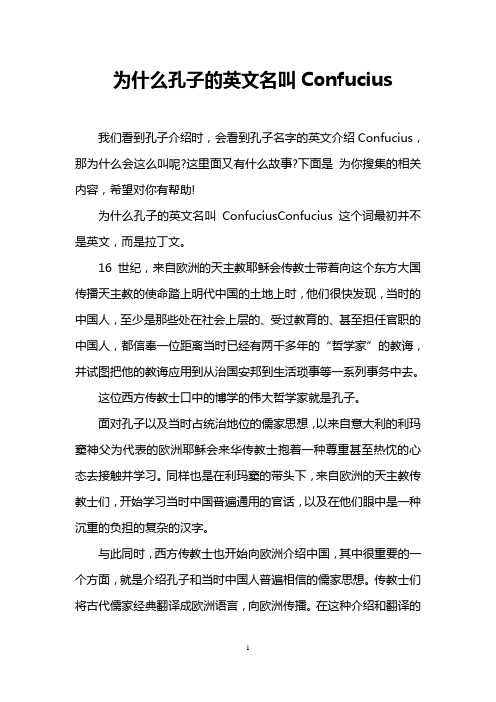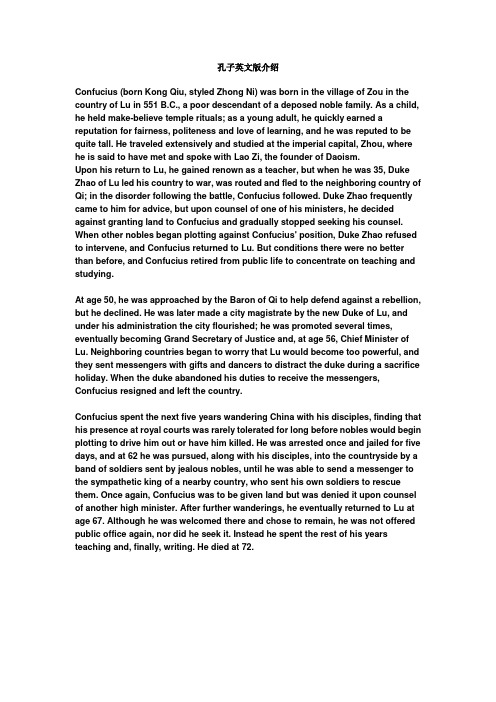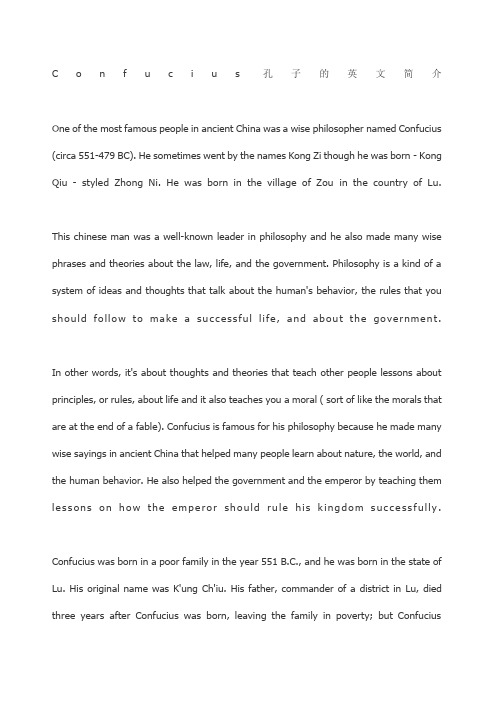孔子【英文】 Confucius
Topic 1 Confucius 孔子

In educational practice, he created flexible teaching methods, promoting the combination of learning and thinking, learning and reviewing as well as teaching and learning. He emphasized on individualized and heuristic [hjuˈrɪstɪ k]启发式的teaching . These ideas are still of great significance in practice today.
相传他有弟子三千,其中七十二贤人。孔子去世后,其弟子 及其再传弟子把孔子及其弟子的言行语录和思想记录下来, 整理编成儒家经典《论语》。
As one of the greatest thinker, educator, philosopher and the founder of the Confucian school and Confucianism in the history of China, Confucius’ legacy [ˈleɡəsi]遗产 lies in the following three aspects:
700多年前,马可·波罗开辟了中意交往的先河,此后的利玛窦、郎世宁进一步拉近了 中意两国人民的距离。
A Brief Introduction
A Brief Introduction
Confucius (551 B.C—479 B.C.) is one of the most famous Chinese people. As the founder of Confucianism, his thought has exerted a deep influence
为什么孔子的英文名叫Confucius

为什么孔子的英文名叫Confucius我们看到孔子介绍时,会看到孔子名字的英文介绍Confucius,那为什么会这么叫呢?这里面又有什么故事?下面是为你搜集的相关内容,希望对你有帮助!为什么孔子的英文名叫ConfuciusConfucius 这个词最初并不是英文,而是拉丁文。
16 世纪,来自欧洲的天主教耶稣会传教士带着向这个东方大国传播天主教的使命踏上明代中国的土地上时,他们很快发现,当时的中国人,至少是那些处在社会上层的、受过教育的、甚至担任官职的中国人,都信奉一位距离当时已经有两千多年的“哲学家”的教诲,并试图把他的教诲应用到从治国安邦到生活琐事等一系列事务中去。
这位西方传教士口中的博学的伟大哲学家就是孔子。
面对孔子以及当时占统治地位的儒家思想,以来自意大利的利玛窦神父为代表的欧洲耶稣会来华传教士抱着一种尊重甚至热忱的心态去接触并学习。
同样也是在利玛窦的带头下,来自欧洲的天主教传教士们,开始学习当时中国普遍通用的官话,以及在他们眼中是一种沉重的负担的复杂的汉字。
与此同时,西方传教士也开始向欧洲介绍中国,其中很重要的一个方面,就是介绍孔子和当时中国人普遍相信的儒家思想。
传教士们将古代儒家经典翻译成欧洲语言,向欧洲传播。
在这种介绍和翻译的过程中,就不免要翻译儒家创始人至圣先师孔子的名字。
罗马天主教会的官方语言一直以来都是继承自罗马帝国的拉丁语,随着时间的推移,古罗马时代使用的古典拉丁语在中世纪天主教会那里演变成了「教会拉丁语」,并一直使用到今天。
而拉丁语在当时的欧洲,特别是在欧洲学术界,也是沟通各个不同国家与文化的通用语言。
作为天主教圣职人员的利玛窦等耶稣会传教士,在翻译中国经典和中国人名、地名并向他们的欧洲同胞进行介绍的时候,使用的自然也就是教会拉丁语。
利玛窦选取了孔子比较流行的一个称呼孔夫子,将这个名字用音译的方式翻译成拉丁语。
明朝时期的汉语官话的发音与今天普通话发音的区别并不大,而孔夫子三字在明朝官话中的发音也基本上和今天的kǒngfūzǐ一样。
孔子生平介绍(英文)

孔子英文版介绍Confucius (born Kong Qiu, styled Zhong Ni) was born in the village of Zou in the country of Lu in 551 B.C., a poor descendant of a deposed noble family. As a child, he held make-believe temple rituals; as a young adult, he quickly earned a reputation for fairness, politeness and love of learning, and he was reputed to be quite tall. He traveled extensively and studied at the imperial capital, Zhou, where he is said to have met and spoke with Lao Zi, the founder of Daoism.Upon his return to Lu, he gained renown as a teacher, but when he was 35, Duke Zhao of Lu led his country to war, was routed and fled to the neighboring country of Qi; in the disorder following the battle, Confucius followed. Duke Zhao frequently came to him for advice, but upon counsel of one of his ministers, he decided against granting land to Confucius and gradually stopped seeking his counsel. When other nobles began plotting against Confucius' position, Duke Zhao refused to intervene, and Confucius returned to Lu. But conditions there were no better than before, and Confucius retired from public life to concentrate on teaching and studying.At age 50, he was approached by the Baron of Qi to help defend against a rebellion, but he declined. He was later made a city magistrate by the new Duke of Lu, and under his administration the city flourished; he was promoted several times, eventually becoming Grand Secretary of Justice and, at age 56, Chief Minister of Lu. Neighboring countries began to worry that Lu would become too powerful, and they sent messengers with gifts and dancers to distract the duke during a sacrifice holiday. When the duke abandoned his duties to receive the messengers, Confucius resigned and left the country.Confucius spent the next five years wandering China with his disciples, finding that his presence at royal courts was rarely tolerated for long before nobles would begin plotting to drive him out or have him killed. He was arrested once and jailed for five days, and at 62 he was pursued, along with his disciples, into the countryside by a band of soldiers sent by jealous nobles, until he was able to send a messenger to the sympathetic king of a nearby country, who sent his own soldiers to rescue them. Once again, Confucius was to be given land but was denied it upon counsel of another high minister. After further wanderings, he eventually returned to Lu at age 67. Although he was welcomed there and chose to remain, he was not offered public office again, nor did he seek it. Instead he spent the rest of his years teaching and, finally, writing. He died at 72.孔子(名秋字仲尼)生于鲁国邹村在我国公元前551年, 元老废黜了一个贫苦家庭高贵. 作为一个孩子,他认为地以为庙祭; 作为一个年轻的成年人,他很快赢得美誉公平、礼貌、爱学习,他被誉为是相当高大. 他走遍了研究和广泛的帝国首都周据说他曾与交谈老子,道家创始人. 返回卢,他赢得声威当老师,但是当他35岁赵吕公爵率领乌加战争是落花流水逃往邻国齐; 在混乱的战斗后,孔子之后. 杜克赵常找他请教,但他的一名律师在部长会议他决定对孔子逐渐停止批地给他的律师求. 当其他贵族开始密谋对付孔子地位杜克赵拒绝介入,孔子返鲁. 但没有任何条件比以前更好、离退休孔子退隐专心教学和学习. 50岁时,他遇见了男爵齐协防打击叛乱,但他拒绝. 他后来被新县长作了一个城市格洛斯特路而在他主政全市蓬勃开展; 升任几次,终于成为大政司司长, 年仅56岁,首席部长鲁. 周边国家开始担心,将成为卢太强大送信、送礼物、跳舞,他们分散在公爵牺牲假期. 当公爵遗弃职务领取送信,孔子辞职,离开该国. 未来5年内花费孔子与弟子中徘徊, 法院认定他出席皇家贵族很少容忍多久便开始密谋把他或他杀死. 他被捕入狱后五天,他是在62追求,随着他的弟子, 到郊外一阶士兵发出嫉妒贵族, 直到他能够体谅国王派遣使者到邻近的国家, 当年送自己的士兵拯救. 再次,孔子得到它的土地,但遭到拒绝后,高律师另一个大臣. 进一步漫游后,他终于回到鲁年仅67. 虽然他并没有选择留欢迎,他没有向公职再次他也不求. 而他花了他多年的教学和休息,最后写作. 他死在72.Confucius孔子的英文简介One of the most famous people in ancient China was a wise philosopher named Confucius (circa 551-479 BC). He sometimes went by the names Kong Zi though he was born - Kong Qiu - styled Zhong Ni. He was born in the village of Zou in the country of Lu.This chinese man was a well-known leader in philosophy and he also made many wise phrases and theories about the law, life, and the government. Philosophy is a kind of a system of ideas and thoughts that talk about the human's behavior, the rules that you should follow to make a successful life, and about the government.In other words, it's about thoughts and theories that teach other people lessons about principles, or rules, about life and it also teaches you a moral ( sort of like the morals that are at the end of a fable). Confucius is famous for his philosophy because he made many wise sayings in ancient China that helped many people learn about nature, the world, and the human behavior. He also helped the government and the emperor by teaching them lessons on how the emperor should rule his kingdom successfully.Confucius was born in a poor family in the year 551 B.C., and he was born in thestate of Lu. His original name was K'ung Ch'iu. His father, commander of a district in Lu, died three years after Confucius was born, leaving the family in poverty; but Confucius nevertheless received a fine education. He was married at the age of 19 and had one son and two daughters.He worked as a keeper of a market. Then he was a farm worker who took care of parks and farm animals. When he was 20, he worked for the governor of his district.。
Confucius孔子的英文简介

C o n f u c i u s孔子的英文简介One of the most famous people in ancient China was a wise philosopher named Confucius (circa 551-479 BC). He sometimes went by the names Kong Zi though he was born - Kong Qiu - styled Zhong Ni. He was born in the village of Zou in the country of Lu.This chinese man was a well-known leader in philosophy and he also made many wise phrases and theories about the law, life, and the government. Philosophy is a kind of a system of ideas and thoughts that talk about the human's behavior, the rules that you sh ou l d f ollow to make a su ccessf ul life, and abou t the governme n t.In other words, it's about thoughts and theories that teach other people lessons about principles, or rules, about life and it also teaches you a moral ( sort of like the morals that are at the end of a fable). Confucius is famous for his philosophy because he made many wise sayings in ancient China that helped many people learn about nature, the world, and the human behavior. He also helped the government and the emperor by teaching them l e s s o n s o n h o w t h e e m p e r o r s h o u l d r u l e h i s k i n g d o m s u c c e s s f u l l y.Confucius was born in a poor family in the year 551 B.C., and he was born in the state of Lu. His original name was K'ung Ch'iu. His father, commander of a district in Lu, died three years after Confucius was born, leaving the family in poverty; but Confuciusnevertheless received a fine education. He was married at the age of 19 and had one son a n d t w o d a u g h t e r s.He worked as a keeper of a market. Then he was a farm worker who took care of parks and farm animals. When he was 20, he worked for the governor of his district.。
孔子英文介绍简单

孔子英文介绍简单Confucius, also known as Kong Zi or Kong Fuzi, was a Chinese philosopher, teacher, and political figure who lived during the Spring and Autumn period of Chinese history. His ideas and teachings have profoundly influenced Chinese culture and philosophy for over two millennia.Born in 551 BCE in the state of Lu (in present-day Shandong province, China), Confucius belonged to the lower aristocracy. Despite his humble beginnings, he rose to become one of the most respected thinkers in Chinese history. Confucius' philosophical system, known as Confucianism, emphasized the importance of morality, family, social harmony, and government by virtuous rulers.At the core of Confucian thought is the concept of ren, often translated as "benevolence" or "humaneness." Confucius believed that achieving ren was the ultimate goal of human life and that it could be attained through self-cultivation, education, and ethical behavior. He emphasized the importance of filial piety, respect for elders, and fulfilling one's social roles and obligations.Confucius' teachings were not only philosophical but also practical. He emphasized the importance of education in fostering moral character and creating an orderly society. Confucius himself was a dedicated educator who traveled throughout China, imparting his wisdom to eager students. His disciples compiled his teachings into the Analects, a collection of dialogues and sayings that form the basis of Confucian thought.In addition to his focus on individual morality, Confucius also offered advice on governance and politics. He believed that a virtuous ruler should lead by example, governing with compassion, integrity, and wisdom. Confucius' vision of good governance was based on the principles of benevolence, righteousness, propriety, wisdom, and sincerity.Despite facing opposition and criticism during his lifetime, Confucius' influence continued to grow after his death in 479 BCE. His ideas became the foundation ofChinese civilization, shaping everything from government institutions to social norms and cultural practices. Confucianism became the dominant school of thought in China for centuries, influencing not only Chinese society but also neighboring countries like Korea, Japan, and Vietnam.In modern times, Confucius remains a revered figure in Chinese culture, and his teachings continue to resonate with people around the world. His emphasis on ethics, education, and social harmony provides valuable insights into addressing contemporary challenges and building a more just and compassionate society.In conclusion, Confucius was much more than a philosopher; he was a visionary whose ideas continue to shape the way we think about ethics, education, and governance. His enduring legacy serves as a reminder of the power of moral integrity and the importance of striving for the greater good.。
孔子 Confucius (551-479 BC)—中国历史人物英文介绍

孔子Confucius (551-479 BC)The Greatest ThinkerAlso known as Kong Zi or Kong Qiu in Chinese, the great thinker Confucius was born to a warrior's family during the late Spring and Autumn Period(770-476 BC). He lost his father when he was only three and lived in poverty with his mother who died when he was 17 years old.When he was young, Confucius was a diligent student with a strong interest in a wide range of subjects. When visiting a temple, he would try to learnthe art of moderating rituals. During the day, he would learn accounting and at night, he would practice playing musical instruments. When helpingothers herd sheep, he would ask to learn archery. Once, he even went to meet Lao Zi, the great philosopher, to ask for advice on conducting rituals.When he was 30, he began to open schools and enrolled some 3,000 students. Among them, 72 were noted scholars who later helped to compileancient books and put Confucius' thinking into the book titled "The Analects".He spent more than 10 years touring various states withhis students and disciples to advocate his ideas on correct conduct and the best government.According to Confucius, the best government is one that rules through rites and people's natural morality, not through bribery and coercion.He explained that if a ruler led his people by morality, he was like the North Star, which would be surrounded by countless other stars. But if he usedadministrative orders and severe punishment to constrain his people, he could probably force them to refrain from committing crimes, but they wouldnot understand that it's shameful to commit crimes. And only when they had acquired the "sense of shame" would they become good.Confucius was also thought to be the editor and author of the Five Classics, namely, Shi (诗Book of Songs), Shu (书Book of History), Li (礼Book ofRites), Yi (易Book of Change) and Chunqiu (春秋Spring and Autumn Annals). He also advocated familial loyalty, ancestor worship, respect of elders bytheir pious children and subjects' loyalty to their ruler.As a result, Confucius' ideology was deemed as dominating force in the feudal society that lasted for more than 2,000 years in China.His thinking also became an important guiding ideology in many countries in East and Southeast Asia, such as Japan and Singapore.His famous quotations include:—Study and review what you have learned every day, isn't it joyful? With friends coming from afar, isn't it delightful? One doesn't frown on other'smisunderstanding, isn't he a respectable man?—To acknowledge one's fault and be willing to change it is the greatest virtue.—If you know, to recognize that you know; if you don't know, to realize that you don't know: That is knowledge.Once, Zi Gong, one of Confucius' disciples, asked the philosopher: "Is there any one word that can guide one throughout his life?" Confucius answered:"Maybe it's magnanimity! What you do not want done to yourself, do not do to others."That's perhaps one of the earliest versions of the Golden Rule.。
confucius的用法和例句

confucius的用法和例句【释义】confuciusn.孔子(中国哲学家,教育家)【短语】1Confucius Institute孔子学院;孔子学堂;孔子;孔子学院孔子课堂孔子学校汉学院孔子学堂中华传统文化2disciples of confucius孔子弟子列表;孔子弟子3Beijing Temple of Confucius北京孔庙4Analects of Confucius论语5The Analects of Confucius论语6Confucius Temple孔庙;夫子庙;孔子庙;吉林文庙7Rediscover Confucius重新发现孔子;重新发觉孔子8Taipei Confucius Temple台北市孔庙;台北孔庙9Confucius and Mencius孔孟;孔孟之道;鲁能乃孔孟;框定孔孟【例句】1As Confucius grew up he wanted to learn things.随着孔子长大,他想学习一些东西。
2Confucius was good at music when he was fifteen.孔子十五岁时就擅长音乐。
3Confucius was a pioneer in the field of education.孔子是教育领域的先驱。
4Confucius educated about3,000students in his lifetime.孔子一生中大概教过3000名学生。
5Confucius is considered the greatest of the ancient Chinese sages.孔子被认为是古代中国最伟大的圣人。
6The doodle is the latest in the recent rehabilitation of Confucius.在近来孔子复兴热中,这个涂鸦是最新的表现。
7When he was a man,Confucius became the ruler of the city of Changtu.孔子成年后,成为了昌图市的统治者。
英文孔子介绍

1
Confucius, also known as Kong Fuzi, was a great thinker and educator in Chinese history. He was born in the state of Lu in the Spring and Autumn period and lived betwe
-
感谢您的莅临
Li
英文孔子介绍
(propriety) and Zhong (loyalty) in interpersonal relationships, and believed that these qualities are necessary for maintaining social harmony and stability
英文孔子介绍
Confucius' philosophy and teachings have had a profound impact on Chinese history and culture, and continue to influence many aspects of modern society. His ideas about humaneness, righteousness, propriety, and wisdom have become deeply ingrained in Chinese culture and society, and are widely practiced and respected today
2
en 551 BCE and 479 BCE. His philosophy and teachings have had a profound impact on Chinese and东方文明, and his ideas continue to influence many aspects of modern society
- 1、下载文档前请自行甄别文档内容的完整性,平台不提供额外的编辑、内容补充、找答案等附加服务。
- 2、"仅部分预览"的文档,不可在线预览部分如存在完整性等问题,可反馈申请退款(可完整预览的文档不适用该条件!)。
- 3、如文档侵犯您的权益,请联系客服反馈,我们会尽快为您处理(人工客服工作时间:9:00-18:30)。
• • • • •
The I Jing (“Book of Changes”) The Shu Jing (“Book of History”) The Shih Jing (“Book of Odes” [poetry]) The Li Ji (“Book of Rites”) The Ch’un-ch’iu (“Spring & Autumn Annals”)
The further expression of Confucian philosophy
“The Four Books” (Ssu-chu)
• • • •
Analects (Lun-Yu) The Doctrine of the Mean (Zhongyong) The Great Learning (Ta-hsueh) The Book of Meng-Tzu (Mencius, 371-288 BC)
Confucius (Kung Fu-Tzu)*
(551-479 BCE)
& Confucianism
*Family name = Kung (Kong) Personal name = Zhong-ni Kung Fu-Tzu (Kong Fu-zi) = “Master Kung” “Confucius” = Latinization of “Kung Fu-Tzu”
The primary sources of Confucian philosophy
Confucius claimed to derive his teachings from “the Ancients,” whose wisdom is embodied in “The Five Classics” (Wu Jing)
• 221-207 BCE: Qin (Ch’in) Dynasty (“The Burning of the
Books” in 213 BC) - Legalism enthroned; Confucianisontinued
• 206 BCE-25 CE: Former • 266-316 CE: Jin (Chin) Han Dynasty (beginnings of Dynasty official state Confucianism) • 316-589 CE: Era of North• 25-220 CE: Later Han South Division - 16 Northern Dynasty (rise of Chinese
• The Medieval Age (2nd-10th centuries CE): relations & conflicts between Confucianism, Taoism, & Buddhism • The Modern Age (11th century -Present)
– Neo-Confucianism (incorporation of Taoist & Buddhist elements in an overall Confucian perspective) (Chu Hsi, 1130-1200 CE & many others) – 20th century impact of Western philosophies such as Pragmatism & Marxism
The History of Chinese Philosophy
• The Classical Age (6th century BCE-2nd century CE)
– – – – – – Confucianism (Confucius, 551-479 BCE) Taoism (Lao Tzu, 6th century BCE) Mohism (Mo Tzu, 468-376 BCE) The Yin-Yang School (founder unknown) The School of Names (Logic) (Hui Shih, c. 380-305 BCE) Legalism (Han Fei Tzu, d. 23 BCE)
Chronology of Chinese History
• c. 6000 BCE: Prehistory (belief in life after death; bone
divination) - legendary Hsia Dynasty (c. 1994-1500 BC)
• c. 1500-1040 BCE: Shang Dynasty (polytheism;
Anthem
The ancient State of Lu
That’s where Confucius was born & spent most of his life.
Confucianism originated in China, but its influence spread to Korea & Japan over the centuries.
spiritism; ancestor veneration; bone & shell divination)
• 1040-256 BCE: Zhou (Chou) Dynasty (feudal era &
classical age; rise of Shang-Ti & “Mandate of Heaven;” ancestor veneration & divination practices; continued belief in spiritism; interest in life-prolongation & immortality; 8th-5th centuries BC period of disorder; emergence of classical Chinese philosophies: Confucianism, Taoism, Mohism, Legalism, etc.) - Era of Warring States (475-221 BC)
